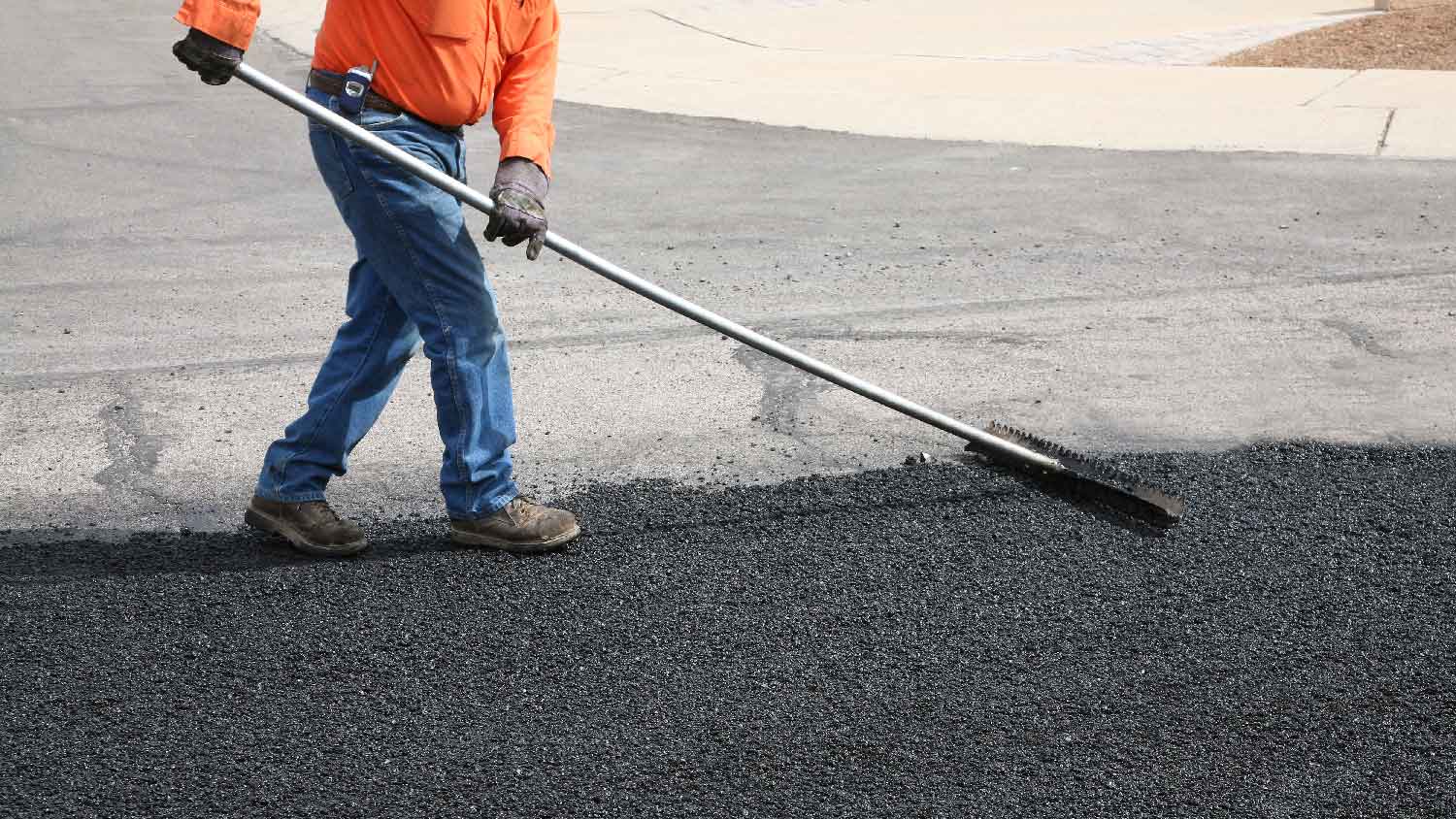
When designing a driveway, it's crucial to know the cost of your driveway apron—the transitional ramp that connects you to the road. Here's what to know.
Asphalt is a common paving material for driveways, roadways, sidewalks, and parking lots
Asphalt is a paving material commonly used for roads, driveways, walkways, and even roof shingles.
Asphalt is made of aggregate materials, like gravel and sand, and bitumen.
Asphalt has several pros, including flexibility and affordability.
Asphalt does have some downsides to consider, however.
Asphalt is an incredibly common material that we walk and drive on every day. Asphalt covers our highways and city streets, our bike paths and race tracks, our parking lots and sidewalks, and even our airport runways and our roofs. But what is asphalt made of?
Below, we’ll define asphalt, discuss its common uses, and review its pros and cons.
Asphalt is a composite material used for paving surfaces for walking and driving. It is made of aggregate materials—such as crushed rocks, sand, and gravel—and bitumen, a sticky, petroleum-based substance. The ratio is typically 95% aggregates and 5% bitumen. When mixed together at high temperatures, these materials form a highly effective (and affordable) paving material.
Asphalt may also contain additives, such as polymers, rejuvenators, mineral fillers, and polyphosphoric acid, to increase its performance.
Asphalt is a highly versatile paving material that can be used for a variety of public, commercial, and residential uses, including:
Roadways
Driveways
Sidewalks
Parking lots
Play areas
Sport surfaces
Bike paths
Airport runways
Race tracks
Roofs
Flooring
Railway tracks
Ports
Landfill caps
Asphalt is a common driveway paving material, but it’s not your only option. Here are some other ways you can pave your driveway or walkway at home:
Concrete: Durable, versatile, and common, though it requires a fair amount of maintenance.
Gravel: Permeable and easy to install, but can be tricky with steep slopes
Brick: Elegant and durable, but expensive

Asphalt is a great driveway material with plenty of benefits, but there are also some disadvantages to consider.
Affordable: The cost to install an asphalt driveway is more affordable than that of a concrete or brick driveway.
Easy to install: Asphalt driveway installation is fast and easy. You should be able to drive on your asphalt within a day of installation. A local asphalt company can tackle the job in a single day.
Easy to maintain: Asphalt maintenance is easy; the main task is resealing. You may need to resurface and repair cracks over time. Asphalt driveway repair costs $2,450 on average.
Durable and flexible: Asphalt is a great paving material because it’s highly resistant to weather, including rain, snow, and extreme temperatures. It’s less likely than concrete to crack over time.
Amount of maintenance: Asphalt maintenance may be easy, but the material also requires more frequent maintenance than some other materials.
Longevity: Asphalt driveways last 15 to 30 years—not bad, but still shorter than the typical lifespan for concrete driveways.
From average costs to expert advice, get all the answers you need to get your job done.

When designing a driveway, it's crucial to know the cost of your driveway apron—the transitional ramp that connects you to the road. Here's what to know.

The cost of a tar and chip driveway falls between gravel and asphalt. Is this unique process the happy medium you've been looking for? Let's take a look.

Asphalt driveway repair costs account for everything from hairline cracks to complete overhauls. Learn what to expect from your asphalt repair bill.

Learn how to keep your asphalt driveway protected longer as we compare the performance of water-based vs. oil-based sealer for a driveway.

Though it seems straightforward, your driveway actually has a lot of parts. From the apron to the trench drain, here are the driveway terms you should know.

Our eight gravel driveway maintenance tips, including raking and spraying, make it easy to keep your gravel driveway looking good and functioning properly.